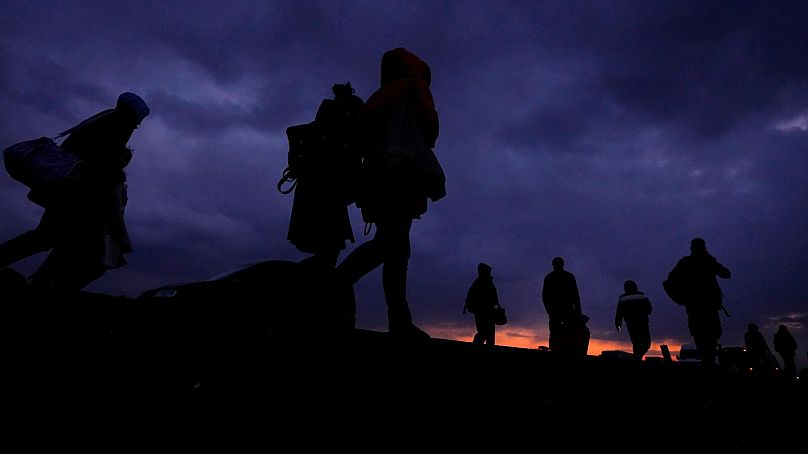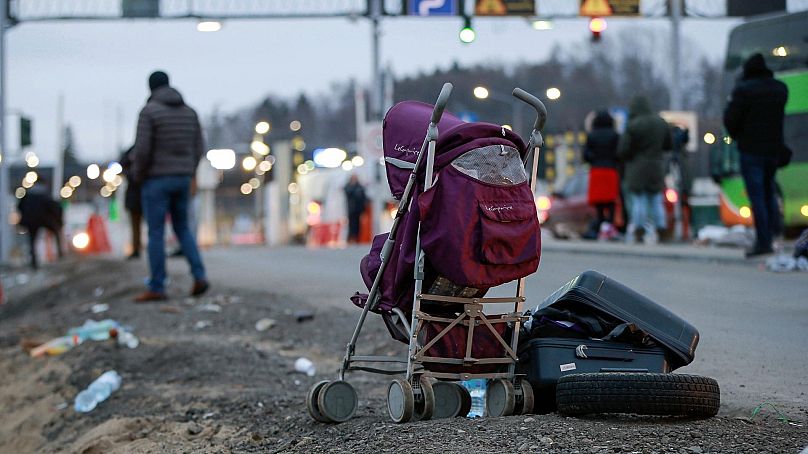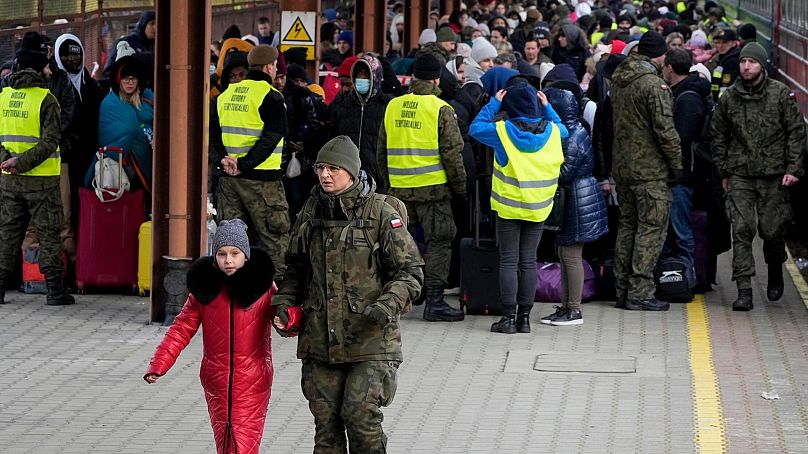In Ukraine, the growing distinction between our treatment of white refugees and refugees of colour speaks volumes about what some Europeans believe an asylum seeker should really look like.
Over 677,000 refugees have fled the conflict in Ukraine so far, with neighbouring countries opening their doors to tens of thousands of people since the Russian invasion began last week.
But while international praise is heaped upon countries like Romania, Hungary and Poland for accepting asylum seekers from Ukraine, not all refugees are being welcomed with open arms.
As border queues continue to form, reports are emerging of black and brown people being stopped and - in some cases - turned away completely from neighbouring nations.
"We went to the border of Ukraine and Poland, but we African foreigners had problems crossing,” says Jean-Jacques Kabea, a Congolese pharmacy student living in the Ukrainian city of Lviv.
“It's normal for women and children to be given priority, but for men, we stayed from morning to night in the cold, standing up, without food. We stayed four days without eating anything.”
"The soldiers there, they tell you: ‘you are going to stay here, you are fleeing the war, stay here, you are going to fight with us, you are not going to leave, especially you black people’.”
Jean-Jacques has now returned to Lviv, where he hopes the Congolese Ambassador to Germany will help him secure safe passage across the Ukrainian border.
"I called him personally and I told him: ‘I am here with 40 Congolese students who have come to study here and this is the situation we are facing. We are refused exit, what can we do?’
“I sent him the name of the border post where we were, and he said he would contact me. That was yesterday at 2pm. Until this morning, he hasn’t called back."
Europe's largest refugee crisis in a century
With over half a million refugees having now left Ukraine, the European Union has invoked a never-before-used law to help the asylum system stay afloat amid the ongoing evacuation.
Ylva Johansson, the European Commissioner for home affairs, says the Temporary Protection Directive will provide the bloc with a fast way to manage the influx of refugees who are expected to enter EU nations in coming weeks.
In the meantime, Hungarian Prime Minister Viktor Orbán said his country is "letting everyone in", while Poland declared its borders open to fleeing Ukrainians - even those without official documents.
"We are looking at what could become Europe's largest refugee crisis this century," says Filippo Grandi, the UN Refugee Agency chief.
“There is a clear indication that many more people are on the move. They are in need of protection and support.”
Why, then, are so many reports of racism emerging from the evacuation of Ukraine?
Political scientist Ziad Majed claims that the "magnificent solidarity and humanism" shown towards the people of Ukraine reveals a "shocking distinction between Ukrainian citizens and refugees from the Middle East.”
"When you hear certain comments talking about 'people like us', it suggests that those who come from Syria, Iraq, Afghanistan or Africa are not,” says the professor at the American University of Paris.
This notion has been hinted at in recent days by senior European politicians - many of whom have drawn an intentional divide between white refugees and their non-white counterparts.
“These are not the refugees we are used to,” said Bulgarian Prime Minister Kiril Petkov earlier this week.
“These people are intelligent, they are educated people. This is not the refugee wave we have been used to: people whose identity we are not sure of, people with unclear pasts, people who could have been terrorists."
Petkov's comments have drawn allegations of racism, for implying that non-European migrants are less intelligent and even more dangerous than Ukrainian nationals.
But for many third-country citizens waiting to leave the besieged nation, these sentiments are an all too familiar part of day-to-day life.
'Ukrainian’s go first'
Like many of the people huddled around the outskirts of Lviv Railway Station, Amanjyot is waiting to find a way out of Ukraine.
She is one of many Indian medical students attempting to flee the Russian invasion. So far, her attempts have been in vain.
“The Indian embassy and Indian government are trying to evacuate students from the borders, so we are trying to reach those,” she says, warming her hands over a makeshift fire.
Her journey so far has been plagued with racism.
"Yesterday, we were trying to board the train, but they were letting the Ukrainians go first. And then somehow we managed to board the train and the boys boarded later, after everyone else.”
She is not alone in her experiences. Just a short distance away, Yusuf Abdallah is also waiting to find a way to a nearby border.
The Tanzanian medical student was barred from entering the city’s central train station yesterday - despite being in possession of a valid ticket.
"We had to pick up some friends who were using another train,” says Yusuf.
“We wanted to go to the train, but we were stopped outside and told not to go in. But other people, like the Ukrainians, could go in. So that's a big problem here.”
Before the Russian invasion began, the UN's International Organisation for Migration estimated that 470,000 third-country nationals were living in Ukraine - including a large number of overseas students and labour migrants.
According to the UN, refugees are not supposed to face discrimination based on race, religion or country of origin.
But as the crisis continues to unfold, more and more instances of racism are disclosing an uncomfortable divide between Ukrainian nationals looking for shelter - and non-Ukrainian nationals in search of the exact same thing.
“Many people remain stranded amidst the worsening security situation," says Safa Msehli, a UN spokeswoman.
"We appeal to states to protect people forced from their homes due to the fighting and to allow them to cross Ukraine's borders safely - without discrimination."
Watch the video above to find out more.














